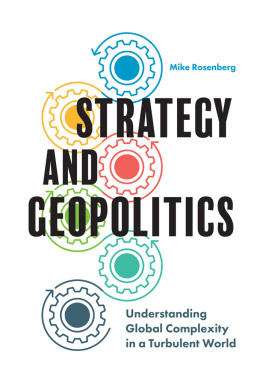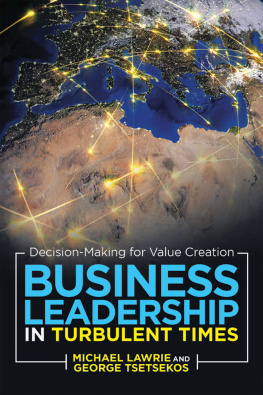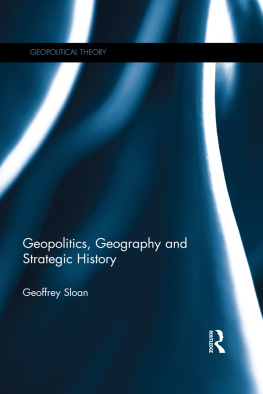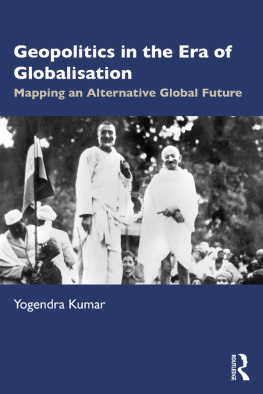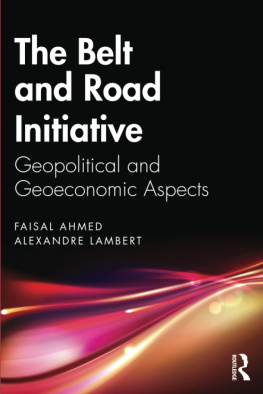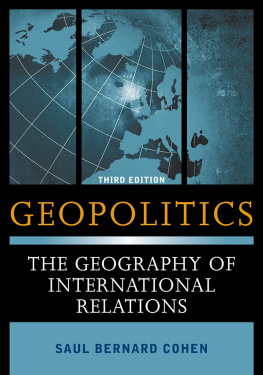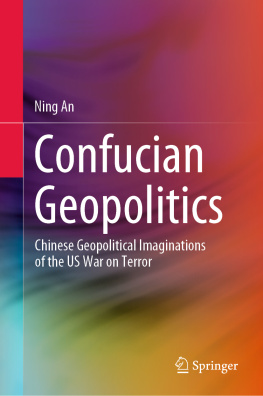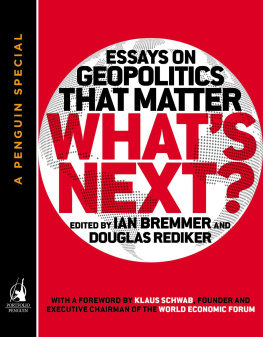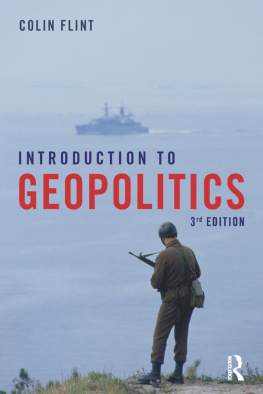STRATEGY AND GEOPOLITICS
Understanding Global Complexity in a Turbulent World
STRATEGY AND GEOPOLITICS
Understanding Global Complexity in a Turbulent World
By
MIKE ROSENBERG
IESE Business School, Barcelona, Spain

United Kingdom North America Japan
India Malaysia China
Emerald Publishing Limited
Howard House, Wagon Lane, Bingley BD16 1WA, UK
First edition 2017
Copyright 2017 Emerald Publishing Limited
Reprints and permissions service
Contact:
No part of this book may be reproduced, stored in a retrieval system, transmitted in any form or by any means electronic, mechanical, photocopying, recording or otherwise without either the prior written permission of the publisher or a licence permitting restricted copying issued in the UK by The Copyright Licensing Agency and in the USA by The Copyright Clearance Center. Any opinions expressed in the chapters are those of the authors. Whilst Emerald makes every effort to ensure the quality and accuracy of its content, Emerald makes no representation implied or otherwise, as to the chapters suitability and application and disclaims any warranties, express or implied, to their use.
British Library Cataloguing in Publication Data
A catalogue record for this book is available from the British Library
ISBN: 978-1-78714-568-9 (Print)
ISBN: 978-1-78714-567-2 (Online)
ISBN: 978-1-78714-978-6 (Epub)
To my family, friends, and colleagues for supporting me, helping me find the time and space to think and write, and for sharing their ideas with me.
Contents
Introduction
Many firms today are living in a schizophrenic period. On the one hand some of their largest and most profitable markets are faced with a sluggish economy, intense competition, and the need for constant innovation coupled with relentless cost cutting.
At the other extreme, these same companies are investing enormous sums to acquire or grow positions in emerging markets in Asia, Latin America, and Africa which are all about growth and in many cases are years away from showing significant profits. These investments are often made based on available data on economic growth and optimistic forecasts showing rising prosperity.
The problem is that such decisions do not always look deeply enough at the political and geopolitical issues at play in many of these countries. Often it is these kinds of issues, as opposed to more conventional business concerns, which can upset the forecasts and cause serious problems.
The ups and downs in the price of oil, Brexit, the election of Donald Trump to the Presidency of the United States, and continued tension in the South China Sea are only a few of the geopolitical issues that currently threaten the status quo upon which many businesses have crafted their international operations and global supply chains.
Today, more than ever, companies need to be able to navigate these issues and build resilience into their way of doing business. Unfortunately, the men and women who run and govern most large international companies are ill equipped to do this.
One of the reasons is that although they possess vast industry expertise and functional knowledge, many of the senior executives and members of Boards of Directors often do not know enough about such issues and how they play out in some of the countries and regions that they do business in.
In the first place, many such people have studied business or engineering and simply do not spend their time reading history or studying comparative cultures and languages. Furthermore, their 24/7 schedules and wide ranging responsibilities make dedicating time to deep reflection extremely difficult. Faced with overwhelming global complexity it is also hard to even know what they should look at if they could squeeze out a few hours or days for the task. The result is that too often they rely on consultants or oversimplified frameworks to make decisions about critical investment decisions.
Typically, senior executives fly into a foreign country, are picked up at the airport and divide their time between hotels, restaurants, and meetings with colleagues, clients, and partners. During such trips, they rarely have time to see the country around them or to appreciate important cultural, political, and geopolitical issues.
To make matters more complicated, once investments are made, many large companies rely on complex matrix organizations to make things happen. The matrix will have business unit heads with global responsibility, other executives managing large parts of the world such as Asia Pacific, and global functional heads responsible for finance, human resources, and the global supply chain. What they often no longer have are Country Managers.
In the past, it was often this figure who would reliably inform headquarters about local issues and also act as corporate ambassador at the national level. Even when companies do have a local representative today, many of these people are on rotational assignments and sometimes do not find the time to learn the local languages or dig deeply into the countrys history and political situation. Others are simply too junior to play either role effectively.
When critical events do happen executives and the companies they lead are often taken by surprise.
Attacks by terrorist groups such as Boko Harum in Nigeria and Al-Shabaab in Kenya are neither anticipated nor even remotely expected. Larger events such as the civil war in Syria, the de facto partition of Iraq or Brexit have also taken managers by surprise as did the election of Donald Trump.
The objective of Strategy and Geopolitics is to offer Executives and Board Members of international companies a geopolitical perspective on the world as it is today as well as a tool kit to think through the issues affecting their businesses in the parts of the world in which they operate. The purpose of the book is not to replace deep analysis and the work of specialized consultants but to give decision makers sufficient grounding in the field so that they can ask better questions and decide for themselves what to do when faced with contradictory information.
In his book, Power Rules, Leslie Gelb relates a story about U.S. President John Kennedy who, in 1963, listened to reports from a General and another from a diplomat on the situation in South Vietnam. After the General said the South was doing well and the diplomat said the situation was hopeless Kennedy felt compelled to ask if they had visited the same country?

